‘A production in which there is more invention, variety, and good composition, than in any one of the musical dramas of Handel which I have yet carefully and critically examined.’
Charles Burney’s glowing assessment of Amadigi di Gaula, Handel’s fifth London opera, was presumably shared by those who enjoyed the first production of this youthful and exuberant work at the Haymarket Theatre in May 1715, for it was revived in both 1716 and 1717, and, before the decade was out, had travelled to Hamburg for three performance runs. Like so many of Handel’s operas, it then languished in obscurity, and there is no record of Amadigi returning to the English stage until it was performed by Unicorn Opera at Abbey Hall, Abingdon in 1968.
Amadigi is a spectacular magic opera, in the mould of Rinaldo and Teseo, and advertisements promising eighteenth-century theatre-goers effects both magnificent and marvellous also issued a warning to ticket-buyers: ‘whereas there is a great many Scenes and Machines to be mov’d in this Opera, which cannot be done if Persons should stand upon the Stage (where they could not be without Danger), it is therefore hop’d no Body, even the Subscribers, will take it Ill that they must be deny’d Entrance on the Stage.’
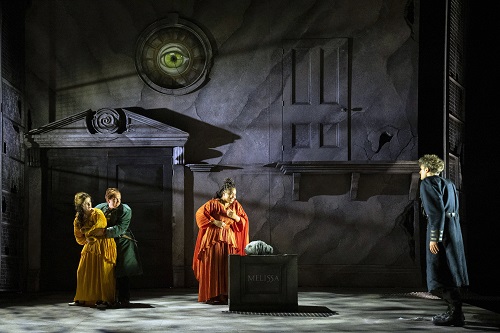
A troop of infernal Spirits, an enchanted porch that splits asunder, monsters that ascend from the bowels of the earth, a cloud-covered chariot that descends from the heavens … such theatrical extravagances don’t immediately suggest that Amadigi is an ideal opera to take on tour, travelling to theatres of diverse dimensions. But, the illusions that Handel’s engineers achieved with panels and hoists can be conjured with video projections and colour, as set and costume designer Neil Irish and lighting designer Rory Beaton demonstrate with aplomb in English Touring Opera’s new production, which opened the company’s 2021 autumn tour at the Hackney Empire. In any case, director James Conway knows that it’s not the engineers’ fabulous transformations but the characters’ emotional suffering and steadfastness that really interested Handel, and his production’s sleights of design serve as telling metaphors for the protagonists’ inner confusions and illusions.
Also tour-friendly are Amadigi’s small cast – just four principals plus the brief appearance of a deus ex machina – and its concentrated action. The infatuated sorceress Melissa has imprisoned Amadigi in order to enchant him with spells, threats, tortures and, when those fail, emotional pleading. He, however, stays true to his beloved Oriana, whom Melissa has locked in a tower, the porch of which is barred by flames. Dardano, Amadigi’s rival for Oriana’s love, joins in Melissa’s stratagems and deceptions, but her conjured visions and cruel vindictiveness win him not his beloved’s heart but, having foolishly challenged Amadigi to a duel, an eternity in hell. Though tricked by illusions and tormented by furies, Oriana and Amadigi remain impervious to Melissa’s blackest arts. When the repentant ghost of Dardano refuses to assist the vengeful enchantress, declaring the resolute lovers to enjoy the gods’ protection, Melissa’s magic turns on its mistress and, reproaching Amadigi, she stabs herself.
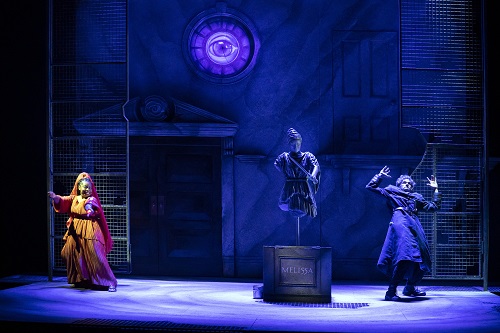
Irish’s designs, bathed in penetrating bold colours by Beaton, complement the tense emotional states that persist throughout the opera. Video-visuals provide the ‘action’ that is largely absent from the libretto, as a panel slides to reveal a wall of roaring flames and we accompany the valiant Amadigi on his rescue mission, as he climbs the sheer, narrow tower. An evil eye stares down from the rear wall, casting its stern, unblinking gaze upon Melissa’s house, which Conway describes as ‘a cross between a renaissance memory theatre and an architectural salvage lot’. The stage is sparsely populated but the statuary, raised doorways and metal grilles lead the onlooker’s eye this way and that, enhancing the sense of bewilderment, as Amadigi’s attempts to escape are baffled by sorcery. A central pedestal celebrating Melissa’s omnipotence becomes – when the statue is, like Ozymandias’ image, rudely fractured and decapitated – a temporary tomb for the lovelorn, suicidal Amadigi. Conway occasionally uses stylisation of design and movement to evoke Melissa’s control and Amadigi’s confinement: the hero winces and jerks as the witch wields the red light-beam that surges from her palm like a malevolent puppeteer. The out-size shoulder pads sported by the rival princes are less effective, but there are other wry touches that inject an alleviating light into the dark drama.
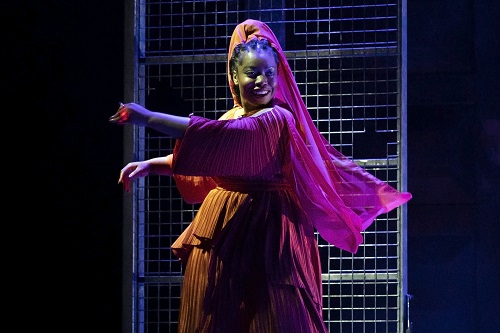
The most interesting character is Melissa, whose heart is suffused with sorrow and sadism in equal measure – emotions which the Nigerian-American soprano Francesca Chiejina communicates with captivating strength, inspiring scorn and sympathy alike. Chiejina’s rich and full-bodied soprano is flexible and easily encompasses the role’s wide range, allowing her to capture the emotional extremes between which Melissa fluctuates. Thus, the beseeching phrases of the first section of Melissa’s opening aria convey the anguish which Amadigi’s rejection afflicts, but such tenderness is swept aside by tempestuousness in the fiery threats that follow. Chiejina’s suppleness and gleaming tone at the top serve her well in the fiery rage aria, with obbligato trumpet, that closes Act 2 – a virtuosic exultation in violent savagery. In contrast, her final arioso ebbs painfully, the interpretative details deeply affecting.
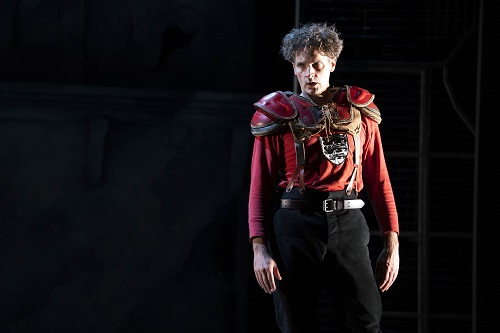
Amadigi is less distinctively characterised by Handel but countertenor William Towers creates a credible hero. His recent disc, Handelian Pyrotechnics, confirmed Towers’ vocal agility and accuracy, and he has no difficulty negotiating the technical hurdles, never pressing his voice too hard even when Amadigi is at his most wracked or fervent. His opening appeal to the night to aid his escape is touchingly phrased, and when mocked by Melissa and rent from Oriana, Amadigi’s pleas for Fate to reunite him with his beloved or let him die are beautifully poignant.
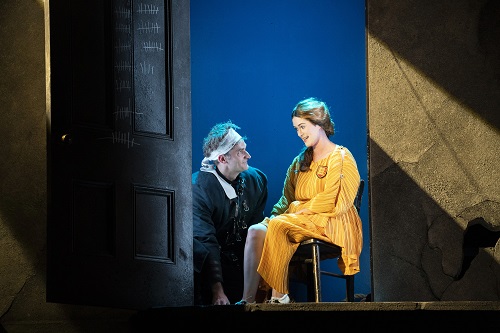
Oriana is almost ‘too good to be true’, and Conway has some gentle fun with her characterisation, portraying her as a patient Penelope whose ceaseless knitting is an emblem of her stalwart faith and persistence, and hinting at her inner passion when she is revealed in her turret enjoying a foot massage from Amadigi. Soprano Harriet Eyley sings Oriana’s love songs with exquisite sweetness, conveying the imprisoned princess’s gentleness and sincerity, and also the pain of her grief when she believes that Amadigi is dead, an agony that gives rise to fierce and intense defiance when she is threatened with torture by the gloating Melissa. Mezzo-soprano Rebecca Afonwy-Jones bring terrific energy to the role of Dardano and, aided by a sombre but beautiful bassoon obbligato, movingly communicates his embittered acceptance that Oriana will not be his.
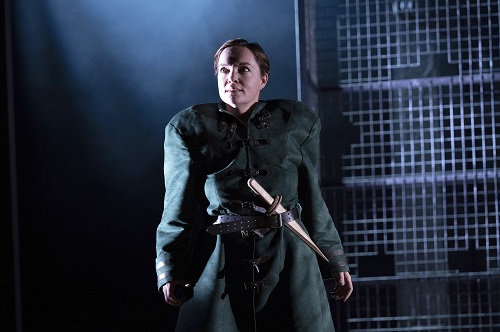
Amadigi is modestly scored – the strings and continuo are complemented by oboes (who double as a pair of recorders in aria), bassoons and a single trumpet – but Handel’s musical imagination works its magic and The Old Street Band relish the panoply of instrumental colours and countermelodies by which Handel penetrates into the heads and hearts of the characters. Conductor Jonathan Peter Kenny’s tempi are generally helpful to the singers, with only a few hasty moments, and he effectively balances the vigorous and the grave.
The torments end with the arrival of Orgando, Oriana’s uncle – a magician who’s been surprising reluctant to exercise his arts up until now – who descends from the sky to unite the lovers. In this ETO production, the role of Orgando – described here as a ‘Visiting God of Love’ – is being taken by a young singer local to each venue, and here it was Zechariah King who led the final chorus of happiness, delivering the few lines of recitative with impressive composure and clarity.
The place and period in which Amadigi is set are not specified, but magic is timeless and this English Touring Opera production enchants.
This production of Amadigi tours to various venues until 17th November: https://englishtouringopera.org.uk/
Claire Seymour
Amadigi – William Towers, Melissa – Francesca Chiejina, Dardano – Rebecca Afonwy-Jones, Oriana – Harriet Eyley, Orgando – Visiting God of Love; Director – James Conway, Conductor – Jonathan Peter Kenny, Set & Costume Designer – Neil Irish, Assistant Designer – Harry Pizzey, Lighting Designer – Rory Beaton, The Old Street Band.
Hackney Empire, London; Friday 1st October 2021.
ABOVE: William Towers, Francesca Chiejina (c) Richard Hubert Smith